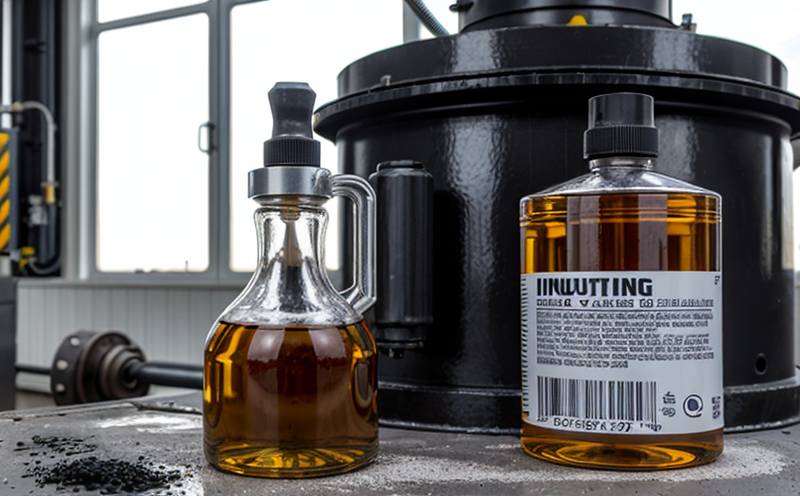DIN 51365 Additive Testing in Lubricating Oils
The DIN 51365 standard is a crucial component of quality assurance and compliance processes within the industrial lubricant sector. This test method evaluates the performance of additives used in various types of lubricants, focusing on their ability to enhance key properties such as wear protection, oxidation stability, and antiwear characteristics.
The procedure involves simulating real-world operating conditions that additives encounter during use in industrial machinery. By subjecting samples to controlled heat treatments and mechanical stress, the test provides a reliable assessment of additive performance under conditions that mimic those encountered by lubricants in actual applications.
Our laboratory adheres strictly to DIN 51365 guidelines for all tests conducted. This ensures consistency and accuracy in results, which is critical for maintaining product quality and ensuring compliance with international standards. The process begins with thorough sample preparation, including precise dilution ratios tailored to the type of lubricant being tested.
Our team uses state-of-the-art analytical equipment capable of detecting even trace amounts of additives, providing accurate data on their effectiveness. Once testing is complete, comprehensive reports are generated detailing the results and any recommendations for improvement or adjustments in formulation.
A key aspect of our DIN 51365 testing service lies in its ability to help clients optimize additive formulations by identifying which components perform best under specific conditions. This information can be invaluable when developing new products or modifying existing ones to better meet market demands and regulatory requirements.
- Ensures compliance with international standards
- Precise measurement of additive performance
- Identification of optimal additive combinations for various applications
- Comprehensive reporting facilitating informed decision-making
In addition to optimizing product quality, our DIN 51365 testing also supports ongoing research and development efforts. By continuously monitoring how additives behave in different environments, we can stay ahead of emerging trends and technologies impacting the industrial lubricant industry.
Our experienced technical staff combines deep knowledge of DIN 51365 requirements with practical experience gained from years of working across diverse industries. This unique blend ensures that every test conducted meets both current standards and future expectations set by regulatory bodies around the world.
Applied Standards
The DIN 51365 standard is part of a broader suite of guidelines designed to promote consistency in additive testing across Europe. It specifies precise methods for evaluating the performance of antioxidants, detergents, and other additives commonly used in lubricating oils.
This standard emphasizes the importance of conducting tests under realistic operating conditions rather than idealized laboratory settings. This approach ensures that the results obtained are relevant to actual field use. The DIN 51365 protocol includes detailed instructions for preparing samples, setting up test rigs, and interpreting outcomes.
Adherence to this standard is particularly beneficial for manufacturers seeking to ensure their products meet stringent quality requirements. Compliance not only enhances brand reputation but also helps avoid costly recalls or product failures due to insufficient additive protection.
Benefits
- Enhanced Product Quality: Ensures that additives perform optimally, thereby improving the overall performance of lubricants.
- Improved Efficiency: By identifying high-performing additives early in the development process, manufacturers can save time and resources while enhancing product quality.
- Regulatory Compliance: Meeting international standards like DIN 51365 helps companies avoid legal issues associated with non-compliance.
- Informed Decision-Making: Comprehensive reports provide valuable insights into which additives are most effective for specific applications, guiding future R&D efforts.
The benefits extend beyond just manufacturing; they also impact end-users by ensuring that the lubricants they purchase offer superior protection and longevity. This ultimately leads to reduced downtime, lower maintenance costs, and increased operational efficiency.
Environmental and Sustainability Contributions
Testing additives according to DIN 51365 plays a significant role in promoting environmental sustainability within the industrial lubricant sector. By ensuring that only effective and environmentally friendly additives are used, this standard helps minimize waste and reduce harmful emissions.
The use of robust additives can extend the service life of machinery, reducing the frequency of replacements and thus lowering resource consumption. Additionally, by improving fuel efficiency through better lubrication, these additives contribute to reduced carbon footprints associated with industrial operations.
Our laboratory actively promotes sustainable practices throughout our testing processes. We encourage clients to consider eco-friendly alternatives during formulation stages and offer recommendations based on sustainability criteria whenever possible.





